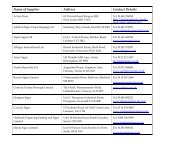titlepage/contents pg 1-16 - British Parking Association
titlepage/contents pg 1-16 - British Parking Association
titlepage/contents pg 1-16 - British Parking Association
You also want an ePaper? Increase the reach of your titles
YUMPU automatically turns print PDFs into web optimized ePapers that Google loves.
Formulating <strong>Parking</strong> Interventions 79required. The Department forTransport document InclusiveMobility provides further detailedguidance on car parking fordisabled motorists and isavailable from the Department’sMobility & Inclusion Unit.In principle a developmentshould have at least oneaccessible car parking bay closeby designated for use bydisabled people. Developmentwith associated car parkingshould have at least two parkingbays for use by disabled people.The appropriate number of bayswill depend on the size andnature of the development, inaccordance with TA 5/95 (5).Access for disabled people whoare reliant on cars does notnecessarily mean that adedicated off-street space mustbe provided within the curtilageof each new development.Suitable spaces can be madeavailable in bays off thecarriageway adjacent to thescheme, and this can sometimesprovide better access thandedicated bays in an off-streetcar park, from which access tothe front door may be lessconvenient.Freight and distributionLorry parking and loading shouldbe considered in acomprehensive parking strategy.A balance has to be struckbetween the local needs ofbusinesses, local circumstancesand the priorities that should begiven to different modesrequiring parking. <strong>Parking</strong>restrictions exist to control theenvironmental impact of lorries inresidential or other areas, whileloading restrictions are usuallyused to control freight access totown centres during peakperiods or daytime shoppinghours. Such restrictions have tobe compatible and still allowbusinesses to receive goods atappropriate times.Overnight lorry parking bans canbe applied in residential areaswhere problems are identified.Generally residents themselvescan be relied upon to notify thelocal authority of lorry parkingthat is causing a nuisance.Common practice is to cover anentire local authority area with aban, and to make exceptionswhere parking is permitted insuitable roads, for example onindustrial estates. Increasingly,lorry bans are being applied notjust overnight, but also all daySaturday and Sunday. Whereblanket bans are proposed, it isclearly important to ensure thatsufficient, suitable parking isavailable at allocated sites.Alternatively, PPG13 suggeststhat the use of agreements onnoise levels and the number ofvehicles parked might offeranother feasible solution.In addition to local overnight lorryparking requirements,consideration should be given tostrategic lorry parkingrequirements, particularly atlocations close to advisory lorryroutes, motorways, Trunk roadsand ports. The provision of restfacilities is of increasing concernwithin the freight transportindustry since the EU Directiveon the organisation of workingtime for mobile workers in roadtransport came into force inMarch 2002. In the main theprivate sector provides for manyof these requirements but ‘noncommercial’needs will oftenremain.The freight industry transportshigh value goods and a secureenvironment, for both staff andShopmobility direction signs.







